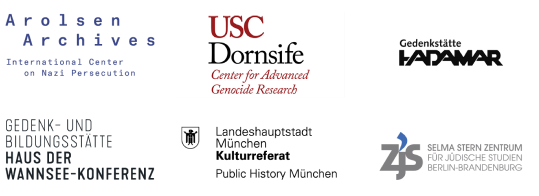Annotations
Stuttgart
November 1941
An officer of the Gestapo or the customs investigation office dressed in civilian clothes inspects luggage in the “Ehrenhalle des Reichsnährstandes”. A woman and two men are standing opposite him at a table on which open suitcases and a package are lying. In the background, a man walks towards the photographer.
Annotations
Keywords
1
Historical context
Deportation von Stuttgart nach Riga am 01.12.1941
On November 27, 1941, municipal and security police officers began to transport Jews from Württemberg and Hohenzollern to Stuttgart on guarded trains and buses. Each person carried a maximum of 50 kilos of hand luggage. Covering up the deportation by naming it “resettlement to the East," the Gestapo housed the people in a temporary assembly camp on the former Reich garden show grounds at Höhenpark Killesberg. There, the persecutees had to hold out for several days in extreme confinement. On the night of December 1, 1941, the Gestapo drove 1,013 people to the “Innere Nordbahnhof” station, where they had to board the special train "Da 33". Two Gestapo officers and twelve municipal police officers escorted the transport to Riga. After arriving on December 4, 1941, the deportees were forced on a one-hour march from the Šķirotava train station to the vacant Jungfernhof estate near Riga and were beaten along the way. Many of the deportees did not survive the winter; most of the others were shot by the SS in the Biķernieki woods on March 26, 1942. Only forty-three people from the transport survived the Shoah.
About the image series
The picture series from Stuttgart includes 24 black-and-white photographs in landscape format. They were probably taken in parallel with a propaganda film about the deportation to Riga commissioned by the Stuttgart municipal authorities.
The series documents various phases in the run-up to deportation at the assembly camp on Killesberg: the inspection of luggage and identity cards in the “Ehrenhalle des Reichsnährstandes” (hall of honor of the Reich farm producers), the delivery of food parcels and the distribution of food in the courtyard, the accommodation of the persecutees in the “Blumenhalle” (flower hall), and the loading of luggage in the inner courtyard.
Photographer
Unknown,
Provenance
Call number at source archive
9200-F-67967
Title at source archive
Gepäck- und Passkontrolle in der sogenannten Ehrenhalle des Reichsnährstands auf dem Gelände der ehemaligen Reichsgartenschau
Acknowledgements
We would like to thank Heike van der Horst and Dr. Günter Riederer from Stadtarchiv Stuttgart for their support in describing the picture series.
Text and research by Kerstin Hofmann.
Kooperationsverbund #LastSeen. Bilder der NS-Deportationen Dr. Alina Bothe Projektleiterin
c/o Selma Stern Zentrum für Jüdische Studien Berlin-Brandenburg
Freie Universität Berlin
Habelschwerdter Allee 34A
14195 Berlin
lastseen@zedat.fu-berlin.de
Ein Kooperationsprojekt von

Gefördert durch

Datenschutz | Impressum